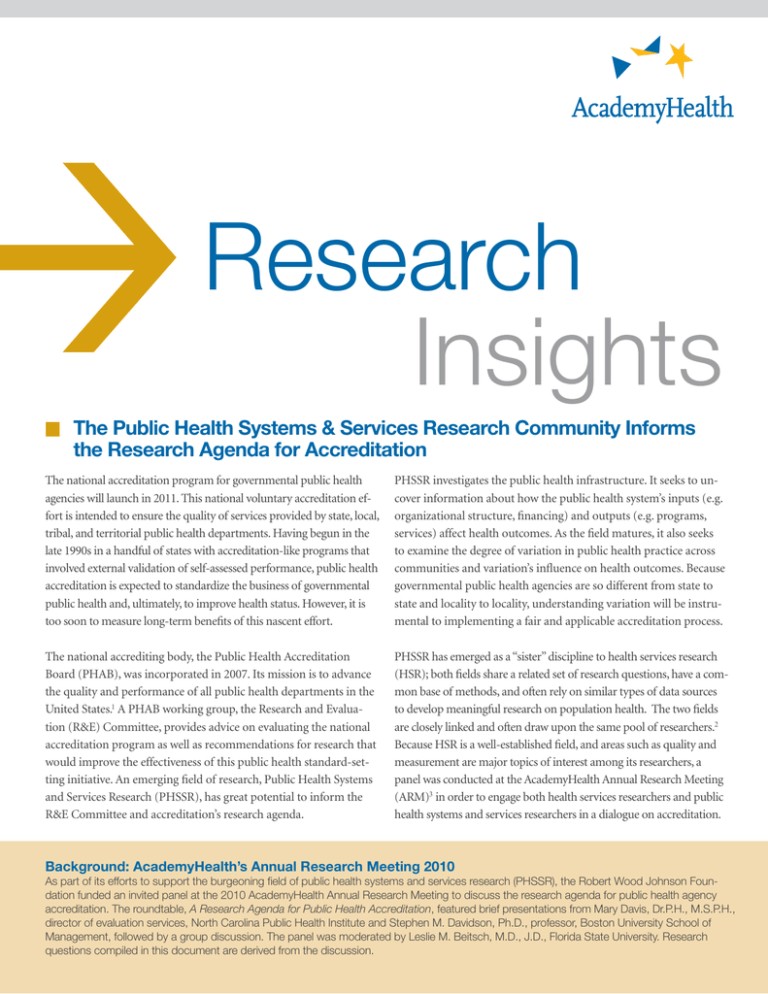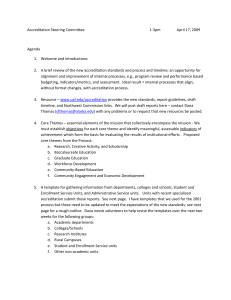Research Insights
advertisement

Research Insights The Public Health Systems & Services Research Community Informs the Research Agenda for Accreditation The national accreditation program for governmental public health agencies will launch in 2011. This national voluntary accreditation effort is intended to ensure the quality of services provided by state, local, tribal, and territorial public health departments. Having begun in the late 1990s in a handful of states with accreditation-like programs that involved external validation of self-assessed performance, public health accreditation is expected to standardize the business of governmental public health and, ultimately, to improve health status. However, it is too soon to measure long-term benefits of this nascent effort. PHSSR investigates the public health infrastructure. It seeks to uncover information about how the public health system’s inputs (e.g. organizational structure, financing) and outputs (e.g. programs, services) affect health outcomes. As the field matures, it also seeks to examine the degree of variation in public health practice across communities and variation’s influence on health outcomes. Because governmental public health agencies are so different from state to state and locality to locality, understanding variation will be instrumental to implementing a fair and applicable accreditation process. The national accrediting body, the Public Health Accreditation Board (PHAB), was incorporated in 2007. Its mission is to advance the quality and performance of all public health departments in the United States.1 A PHAB working group, the Research and Evaluation (R&E) Committee, provides advice on evaluating the national accreditation program as well as recommendations for research that would improve the effectiveness of this public health standard-setting initiative. An emerging field of research, Public Health Systems and Services Research (PHSSR), has great potential to inform the R&E Committee and accreditation’s research agenda. PHSSR has emerged as a “sister” discipline to health services research (HSR); both fields share a related set of research questions, have a common base of methods, and often rely on similar types of data sources to develop meaningful research on population health. The two fields are closely linked and often draw upon the same pool of researchers.2 Because HSR is a well-established field, and areas such as quality and measurement are major topics of interest among its researchers, a panel was conducted at the AcademyHealth Annual Research Meeting (ARM)3 in order to engage both health services researchers and public health systems and services researchers in a dialogue on accreditation. Background: AcademyHealth’s Annual Research Meeting 2010 As part of its efforts to support the burgeoning field of public health systems and services research (PHSSR), the Robert Wood Johnson Foundation funded an invited panel at the 2010 AcademyHealth Annual Research Meeting to discuss the research agenda for public health agency accreditation. The roundtable, A Research Agenda for Public Health Accreditation, featured brief presentations from Mary Davis, Dr.P.H., M.S.P.H., director of evaluation services, North Carolina Public Health Institute and Stephen M. Davidson, Ph.D., professor, Boston University School of Management, followed by a group discussion. The panel was moderated by Leslie M. Beitsch, M.D., J.D., Florida State University. Research questions compiled in this document are derived from the discussion. PHSSR Community Informs the Research Agenda for Accreditation Potential Research Questions During the ARM panel, A Research Agenda for Public Health Accreditation, the panelists and audience engaged in a vibrant discussion about potential research findings that could inform the accreditation initiative. The dialogue suggested that the science of improvement and its related methodologies may be better suited than the science of discovery for research into public health accreditation and quality improvement.4 The following are research questions identified by health services researchers and public health systems and services researchers during that session. Impact and Outcome of Accreditation The national public health accreditation movement formally began in 2005 with a public process called Exploring Accreditation. This project was an effort to explore whether and how a voluntary national accreditation program could advance quality and performance of public health agencies, and if so, to develop a model for such a program. For the hundreds of public health professionals involved in the exploratory phase, the initiative is not new. However, the ARM panel served as a reminder that the concept of accrediting public health agencies is still new to many and may still face resistance. Clearly articulating the goals of accreditation are crucial to its success. Accreditation’s proponents must be able to answer Why are we promoting accreditation? What will accreditation achieve? How will we know? And, to justify the investment, accreditation’s advocates must also be able to explain How do we get there? What will it cost to get there? What will it cost to maintain? Will it be worth the effort? Related questions for HSR and PHSSR include: • What is the effect of accreditation on program implementation? Does it differ across domains (e.g. preparedness, maternal and child health)? •Does accreditation support implementation of evidence-based practices? • Will accreditation shed light on which organizational factors and processes lead to better health outcomes? • What is the value of accreditation? (And how is value defined/ demonstrated?) • Will accreditation ensure accountability? • What is the impact of accreditation on public health policymaking, workforce development, systems/partners engagement, and applied quality improvement strategies? Characteristics of Early/Late Adopters To date, there has been relatively little research conducted to assess or investigate the value of accreditation as measured by improved performance and efficiency, and better community health status. In addition, the costs of preparing for, seeking, and maintain2 ing accreditation remain under-investigated. Researchers want to understand why some agencies choose to seek accreditation while others do not. They are curious to uncover whether individuals drive such choices (leadership, governing boards) and whether objective criteria are used to guide this decision-making. Related questions include: •What decision-making processes do local health department directors go through when choosing whether to seek accreditation? Is the decision influenced by the local board of health? Do political concerns influence the decision? • What are the characteristics of early adopters (health departments and their directors)? • Is adoption influenced by incentives? • For those choosing not to seek accreditation, what are the per- ceived barriers? What evidence from early adopters would make the case for accreditation? • What are the characteristics of agencies that begin to seek accreditation but are not initially successful? What influences the decision to continue versus the decision not to continue to seek accreditation? • Are health departments delaying seeking accreditation because of perceived cost? • Are health departments delaying seeking accreditation because of perceived workload? Or perceived need to increase staff? • Looking at other domains/systems that have implemented accreditation initiatives—what characteristics define their early adopters? Standards and Indicators The public health community has put great effort into developing standards to guide the performance of public health agencies and systems. Yet, the lack of empirical research on the relationship of such standards to health outcomes represents a serious barrier to adoption.5 With performance improvement in mind, accreditation is intended to assist in defining and improving the practice of public health. Because standards are so important to accreditation’s implementation, their development is under careful consideration. The Exploring Accreditation effort concluded that a combination of process, capacity, and outcomes standards would be desirable.6 Since then, draft standards and measures have been revised, and are currently being refined through a beta test at 30 public health agencies. Researchers emphasize a need to identify appropriate state and local health department performance measures that are sensitive and specific to achieving accreditation.7 Related questions include: • Are indicators limited by what can be measured? Do they capture what matters? Is the model designed adequately? PHSSR Community Informs the Research Agenda for Accreditation • Does providing an example in one public health program demonstrate competency in others? Can written documentation provide evidence for all standards and measures, or do we need other means to demonstrate success? • Should standards/indicators be the same across health departments? Or should they take differences (in performance, in health status, in governance) into consideration? How can we assure uniformity in implementing accreditation? • Should accreditation only operate at the health department level, or could it also operate at the program level, allowing smaller health departments with limited services to seek ‘partial’ accreditation? • What metrics are we aiming for? Does the required documentation adequately describe performance for a particular metric? • Is there a linkage of the standards to improved performance and quality and does it translate to improved community health status? Quality There is great expectation that accreditation and quality improvement will improve performance and strengthen the accountability of governmental public health agencies. According to PHAB, “accreditation and quality improvement (QI) are intertwined and support each other…accreditation drives QI, and QI improves the performance of health departments.”8 Some factors that facilitate the adoption and success of QI efforts, as well as strategies proven useful in other industries to advance QI, have been identified.9 However, researchers caution that the evidence needs to be strengthened; evidence to substantiate the link between agency-level QI and improved performance and outcomes is needed. Related questions include: • Does QI capacity ensure improved agency performance? How does it influence a public health system’s performance? • Is there a sequencing between accreditation and QI activities that maximizes agency improvement (i.e. should agencies start with accreditation preparation, adopting QI strategies in response to accreditation results?) • How are quality indicators defined? • Is there a way to create HEDIS-like measures for the public health accreditation board? 3 • How does PHAB accreditation relate to other standards of quality (i.e. Baldridge)? • Should PHAB adapt an ORYX-like system (The Joint Commission’s performance measurement and improvement initiative)? Will ‘never events’ trigger a root cause analysis? Perception Since accreditation aims to improve the health of the public, public perception may be important in securing support. Researchers suggest that simple messages will be key to communicating accreditation’s purpose and warn that describing such a complex process may prove challenging. While the related questions may lie outside the realm of HSR and PHSSR, they were mentioned by these researchers and include: • Does accreditation have any perceived value with the public? Does the public care about accreditation? Should it? • Would marketing campaigns influence public perception? • Will public perception change as accreditation is launched and results become published? • Will public perception influence accreditation status over time? • What is the extrinsic value of the self study? Does it change the way the agency is perceived? • Does accreditation have any perceived value with policymak- ers? Will accreditation influence policymakers’ perceptions of an agency? How? • What is the perceived value of accreditation among the public health workforce? What is the perceived value of accreditation among staff in local public health agencies? Policy Implications Public health systems and services researchers are often trained in public health, and as such, often have a special interest in health equity and social justice. Thus, of great concern is whether accreditation will result in unintended consequences, such as contributing to the disparity between poor and well-resourced health agencies. Researchers suggest that a long term strategy is needed to ensure that underfunded health departments don’t remain underfunded and underperforming as a result of being unaccredited. On the other hand, they caution that an accrediting system unwilling to impose sanctions will not be well received. Related questions include: • How can accreditation be designed so that less resourced health departments don’t suffer but also don’t receive special treatment? • Is there political will? Will the implementation and success of accreditation require political will, especially among local health officials? (Will health officials scoff at another standard/requirement?) • Besides political will, what other factors support or stall attempts to improve performance and quality? What are the impediments to policy change? PHSSR Community Informs the Research Agenda for Accreditation Conclusion The national accreditation program will launch in 2011. In the meantime, PHAB is encouraging health departments who wish to seek accreditation to conduct a community/state health assessment, develop a community/state health improvement plan, and implement a strategic plan. Researchers can get involved in assisting practitioners with these prerequisites, and with fostering a sense of inquiry among those in the field. Research-practice partnerships will be essential to identifying relevant research questions, conducting research, and improving upon the process of accreditation. Ultimately, collaboration between the practice and research community will be instrumental to accreditation’s success. Endnotes 1 www.phaboard.org, accessed August 25, 2010. 2 Holve, E. et al. “A Needs Assessment for Data and Methods in Public Health Systems Research.” AcademyHealth, 2010. Available at http://www.academyhealth. org/files/interestgroups/phsr/FinalPhsrNAjan2010.pdf. 3 AcademyHealth is the professional home for health services researchers. Its annual meeting, the Annual Research Meeting (ARM), is the premier forum for 4 4 5 6 7 8 9 health services research. More than 2,400 researchers attended the 2010 ARM in Boston. A recording of the panel “A Research Agenda for Public Health Accreditation” is available at http://www.academyhealth.org/Training/ResourceDetail. cfm?ItemNumber=5358 Berwick, D.M. “The Science of Improvement.” Journal of the American Medical Association. 2008. 299(10); 1182-1184. The author suggests that “individuals most involved in day-to-day improvement work fear that if ‘evidence’ is too narrowly defined and the approach to gathering evidence too severly constrained, progress may be the victim.” He suggests that in studying social change—which is complex, unstable, and nonlinear—a wider range of scientific methodologies should be embraced. Joly, B.M. et al. “Linking Accreditation and Public Health Outcomes: A Logic Model Approach.” Journal of Public Health Management and Practice. 2007. 13(4); pp. 349-356. Bender, K. et al. “Final Recommendations for a Voluntary National Accreditation Program for State and Local Health Departments: Steering Committee Report.” Journal of Public Health Management and Practice. 2007. 13(4); pp 342-348. Davis, M. Accreditation Outcomes: Getting to the Right Indicators. June 2010. Available at http://www.hcfo.org/files/hcfo/Research%20Brief%20Accreditation%20Perf%20Ind%20062510%20FINAL.pdf. www.phaboard.org, accessed August 26, 2010. Davis, M.V. Opportunities to Advance Quality Improvement in Public Health, Journal of Public Health Management and Practice, 2010. 16(1); pp 8-10.



